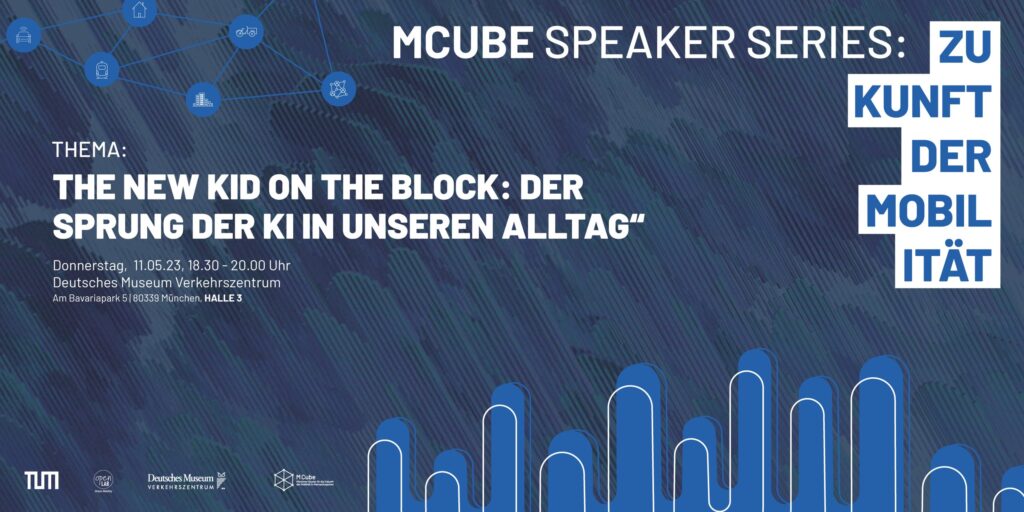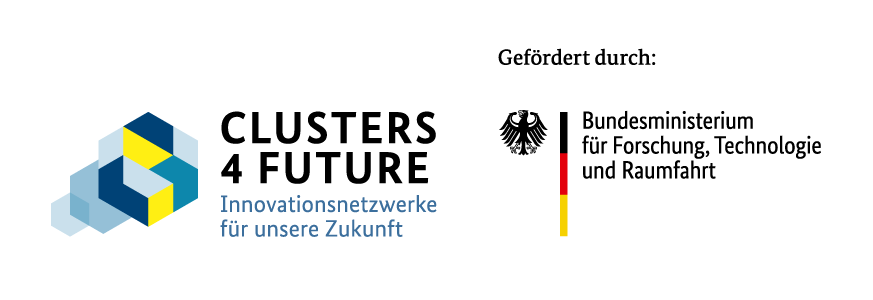
How will artificial intelligence influence the mobility sector? What are the consequences for society and everyday life? Our MCube Speaker Series continues! This time, the topic is "The new kid on the block: AI's leap into our everyday lives".
What is it about?
AI technologies offer immense opportunities for our society and working world, especially in the area of urban mobility. Our cities are becoming ever more densely populated and the demands on transport systems are increasing. The integration of AI enables more efficient traffic planning and control. By analysing real-time data, traffic flows can be optimized and congestion reduced. AI also opens up the possibility of integrating autonomous vehicles into traffic. However, we must also ensure that AI is used responsibly and ethically.
The following questions explain why the future of mobility cannot be imagined without AI:
The future cluster MCube invites you to discuss with experts from various specialist areas:
Prof. Dr. Jochen Hartmann (TUM/ Professorship for Digital Marketing)
Jochen Hartmann's research is located at the intersection of digital marketing and machine learning, with a focus on the analysis of unstructured data (computer vision, natural language processing) and generative artificial intelligence (AI). His substantive research interests include social media, multimodal digital advertising, algorithmic fairness, diversity in advertising and human-machine interactions. His work on text and image mining is among the most widely read and cited articles in top-tier marketing journals, including the International Journal of Research in Marketing and the Journal of Marketing Research. He has also co-authored book chapters on machine learning and natural language processing.
Prof. Dr. Johannes Betz (TUM/ Chair of Autonomous Vehicle Systems)
Johannes Betz studied automotive engineering at Coburg University of Applied Sciences (B. Eng., 2012) and at the University of Bayreuth (M. Sc., 2013). From 2013 to 2018, Johannes was a doctoral student at the Technical University of Munich, where he received his Dr.-Ing. degree in 2019. From 2018-2020 he was a postdoc at the Chair of Automotive Engineering at TUM where he founded the TUM Autonomous Motorsport Team, which successfully participated in autonomous racing series. From 2020 to 2022 he was a postdoc at the University of Pennsylvania, USA, where he worked in the xLab for Safe Autonomous Systems. In 2023, he was appointed Rudolf Mößbauer Professor at TUM as Professor of Autonomous Vehicle Systems. Johannes' field of research is software development for autonomous vehicles. Through the development of algorithms in environment perception, path and behavior planning and control, these vehicles will be able to interact with each other and with people while acting safely, efficiently and powerfully. With these algorithms, it should be possible to make the right decisions fully autonomously, efficiently and effectively, especially in complex and unsafe environments.
Dr. Laura Dornheim (IT Officer and Chief Digital Officer (CDO), City of Munich)
Dr. Laura Dornheim holds a degree in business informatics and a doctorate in gender studies. She has been working as an IT officer and Chief Digital Officer (CDO) at the City of Munich since September 2022. Her main areas of focus include digitalization for the administration and all citizens in Munich as well as digital participation. Laura Dornheim has more than 20 years of experience in the digital industry and most recently worked as a manager in an international IT company.
Dr. Stefanie Lämmle (Head of the Competence Center for Artificial Intelligence in the InnovationLab of the IT Department, City of Munich)
Stefanie Lämmle heads the Competence Center for Artificial Intelligence in the InnovationLab of the IT department of the City of Munich. She studied computer science at the Technical University of Munich and completed her doctorate at the Chair of Computer Technology and Computer Organization. Under her leadership, innovative AI projects have been implemented in recent months, such as tree counting from aerial images, regression analysis for fragmentary traffic counts and an AI-supported solution for recognizing rapid corona tests for blind people. Its commitment to innovation and progress has made the Competence Center a central point of contact for AI solutions in Munich's city administration.
Tobias Glaß (Stadtwerke München/Mobility Strategy)
Tobias Glaß works as Strategy Manager for Connected and Autonomous Mobility in the Mobility Development and Innovation department at the Mobility division of the Munich public utilities. In practice, he is responsible for strategic business field development for digitalization and automation and deals with new mobility solutions. Tobias Glaß graduated in 2015 with a Master of Science in Geography with a focus on mobility research from the Faculty of Applied Computer Science at the University of Augsburg. At SWM, he has been project manager for several R&D projects on autonomous driving since 2018.
